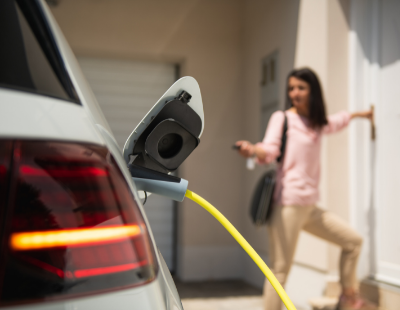It is unsurprising that electric cars have seen an over 28% surge in demand in the last month alone. From rising fuel costs to fears over increasing our carbon footprint, electric vehicles seem to be the antidote to those who want to become more eco-conscious and frugal. In fact, it is projected that by the end of 2022, electric cars will outsell diesel and hybrid diesel.
Below, property expert Gregory Smith from PriceYourJob answers the most pressing questions on how to incorporate an electric vehicle into your everyday life and advises on how to ensure you save money.
Do I really need to install a charging point?
While you actually can use a standard 3 pin plug to charge, this should be reserved for short term-solutions and emergencies and not a method to rely on. Due to the power restrictions of the socket, the vehicle will charge at a slow rate of just 3kW, whereas dedicated charging points can go up to 22 kWh. Using a domestic plug can take as much as thirteen hours to charge fully, whereas a dedicated charging point can be fully charged in under four hours.
If you happen to live near a free charging point then you may be tempted to just use this, however, this is an inconvenient method of charging. Public charging stations can be as slow as domestic plugs, meaning it is unlikely you will be able to get a full charge.
How do you install an electric vehicle charging point?
To install an EV charging point, you must contact a qualified electrician. The work usually takes around 4 hours to install, so it is relatively quick, however, this may vary depending on model specifications and if any additional work needs to be undertaken before the installation.
If you are eligible for a grant towards your charging point, then you must ensure you use an approved installation company. Like other jobs which require a tradesperson, it is highly advisable to get at least three quotes from installation experts.
There are two charge options available in the UK:
-
Level one – considered a slow charge. This level can be plugged into any standard power socket within your house and does not require any additional work.
-
Level two – considered a fast charge. This level will require a 240-volt power supply.
Can I install one myself?
It is unadvisable to attempt to install an EV charging point yourself unless you understand exactly what you are doing. If you do decide to go with a DIY installation, you must comply with IET wiring regulations and your work will need to be inspected and signed off by a professional, which costs money. Especially if you are opting to do a DIY job in an attempt to save money, it is advisable to instead have the installation completed by a professional who can then sign the work off themselves.
How much does it cost to install?
The average cost of installation varies from £800-£1,000, however, there are government funding opportunities which can reduce the cost by £500. To qualify for this grant you must be the registered keeper of an eligible electric vehicle.
How much does it cost to charge an electric vehicle?
This will depend on the type of electric car and your energy tariff. The typical electric car will have a 60kWh battery but there are much smaller and larger batteries available. As the current average domestic electricity rate in the UK is £0.28 per kWh, the cost of charging a 60kWh battery will cost around £16.80, whereas a larger battery of 100kWh will cost around £28 per charge.
Are there any additional costs to factor in?
There are a few additional costs to keep in mind that you may need to approach before or during the installation process, however, this depends on your property and its fuse box. If you do not already have off-road parking, and you have the space, you may consider building a new driveway which will ease access to your charging station and avoid trailing wires across pavements.
You may also need to have your fuse box amended or changed to accommodate for the additional power usage, costing around £350. Your qualified electrician will be able to tell you whether this is a necessary cost.
*Gregory Smith is a property expert from PriceYourJob



















Join the conversation
Be the first to comment (please use the comment box below)
Please login to comment